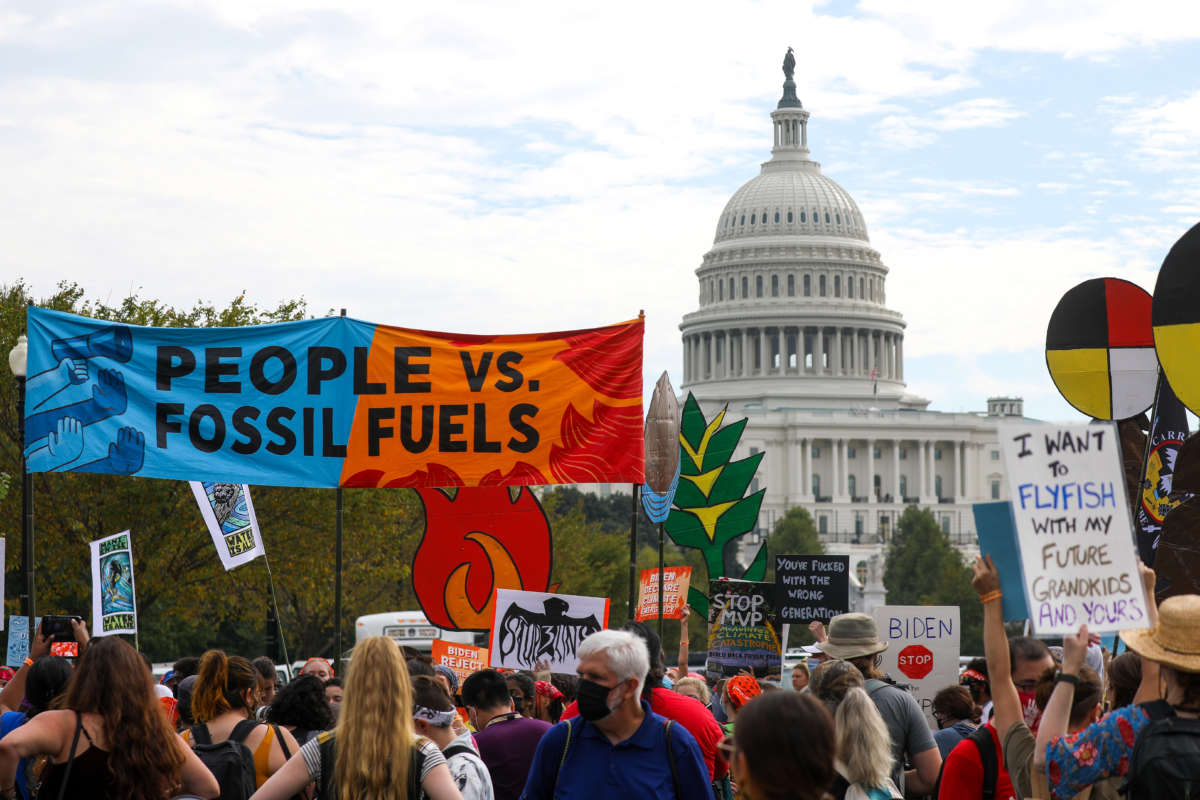Did you know that Truthout is a nonprofit and independently funded by readers like you? If you value what we do, please support our work with a donation.
House Democrats held a landmark hearing on Thursday, forcing leaders of big oil and gas corporations to testify, for the first time before Congress, on the extent to which they lied to the public about the climate crisis in previous decades.
During the hearing, CEOs from Exxon, BP, Chevron, Shell and industry group American Petroleum Institute emphasized their supposed commitments to expanding clean energy and net zero pledges — continuing the decades-long greenwashing and climate denial campaigns that the oil and gas industry has spearheaded since the 1970s.
Notably, the CEOs refused to pledge to stop lobbying against climate bills when prompted by Oversight Chair Rep. Carolyn Maloney (D-New York). “I want to ask each of the witnesses here today representing fossil fuel companies and trade associations to take a simple pledge,” she said. “I want each of you to affirm that your organization will no longer spend any money, either directly or indirectly, to oppose efforts to reduce emissions and climate change.”
In response, Shell CEO Gretchen Watkins failed to give a straight answer, shifting the focus to her company’s lobby for climate policy in a deliberate attempt to mislead. The other CEOs followed suit, refusing to agree to the basic pledge despite their supposed dedication to mitigating the climate crisis.
In reality, fossil fuel companies lobby for bills like the carbon tax — a proposal that climate advocates say is ineffective at best and could poison politicians against real climate action at worst — specifically to greenwash their image. Earlier this year, reporters filmed lobbyists for Exxon saying that backing a carbon tax is “an easy talking point” because “there is not an appetite for a carbon tax” in Washington.
It’s possible that the reason the CEOs refused to take Maloney’s pledge is because they are currently involved in lobbying campaigns against the Democrats’ reconciliation bill. While the bill previously contained a clean energy program that was essential to setting the country on track for vital emissions reductions, fossil fuel lobbyists have already been successful in swaying lawmakers to cut the proposal out.
An analysis from the Oversight Committee released before the hearing on Thursday found that Exxon, Chevron, Shell, BP and the American Petroleum Institute have spent a combined $452.6 million lobbying the government since 2011. Later in the hearing, Rep. Alexandria Ocasio-Cortez (D-New York) highlighted that $55.6 million of that amount has been spent by the industry within just the past few months.
“Earlier this year, [top Exxon lobbyist Keith] McCoy was recorded in a private session saying, quote, ‘I liken lobbying to fishing. You have to bait. You throw that bait out there, just to kind of reel members in, because they are a captive audience. They know that they need you, and I need them,’” Ocasio-Cortez said, highlighting McCoy’s weekly calls with certain members of Congress while the reconciliation bill was formed.
Though Exxon CEO Darren Woods did not say he was aware of McCoy’s calls, he did say that he has been involved in lobbying members of Congress directly during the reconciliation process.
“I think one thing that often gets lost in these conversations is that some of us have to actually live the future that you all are setting on fire for us,” Ocasio-Cortez said, highlighting issues like drought, declining crop yields, fires and climate tipping points that will be caused as the climate crisis evolves unmitigated. “We do not have the privilege or the luxury of lobbyist spin.”
The CEOs continued to lie about the climate crisis during the hearing, denying the cause of the threat and even its very existence. Maloney cited a report from the Defense Department calling the crisis an “existential threat,” and asked Watkins if she agreed with that conclusion. “Ms. Watkins, do you agree climate change is a threat to our existence?” Maloney asked.
Again, Watkins didn’t give a straight answer. “Chairwoman, I agree that climate change is one of the biggest challenges we have in the world today,” Watkins said, before highlighting Shell’s renewable energy initiatives, which are nothing but a distraction from the truth.
These companies’ so-called net-zero pledges aren’t about cutting emissions; they are about rehabilitating their image while claiming to be addressing the issue. None of the large oil companies have a net-zero pledge that would actually cut their emissions — rather, under some scenarios laid out in their net-zero plans, emissions would actually grow.
Trump is silencing political dissent. We appeal for your support.
Progressive nonprofits are the latest target caught in Trump’s crosshairs. With the aim of eliminating political opposition, Trump and his sycophants are working to curb government funding, constrain private foundations, and even cut tax-exempt status from organizations he dislikes.
We’re concerned, because Truthout is not immune to such bad-faith attacks.
We can only resist Trump’s attacks by cultivating a strong base of support. The right-wing mediasphere is funded comfortably by billionaire owners and venture capitalist philanthropists. At Truthout, we have you.
Truthout has launched a fundraiser, and we must raise $31,000 in the next 4 days. Please take a meaningful action in the fight against authoritarianism: make a one-time or monthly donation to Truthout. If you have the means, please dig deep.
